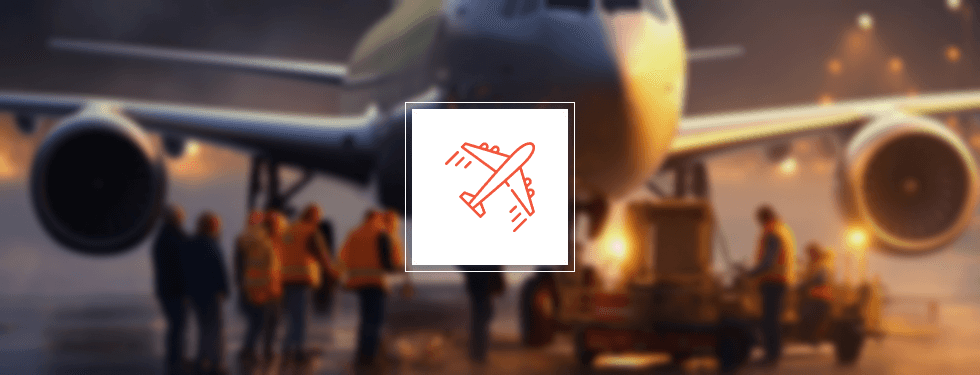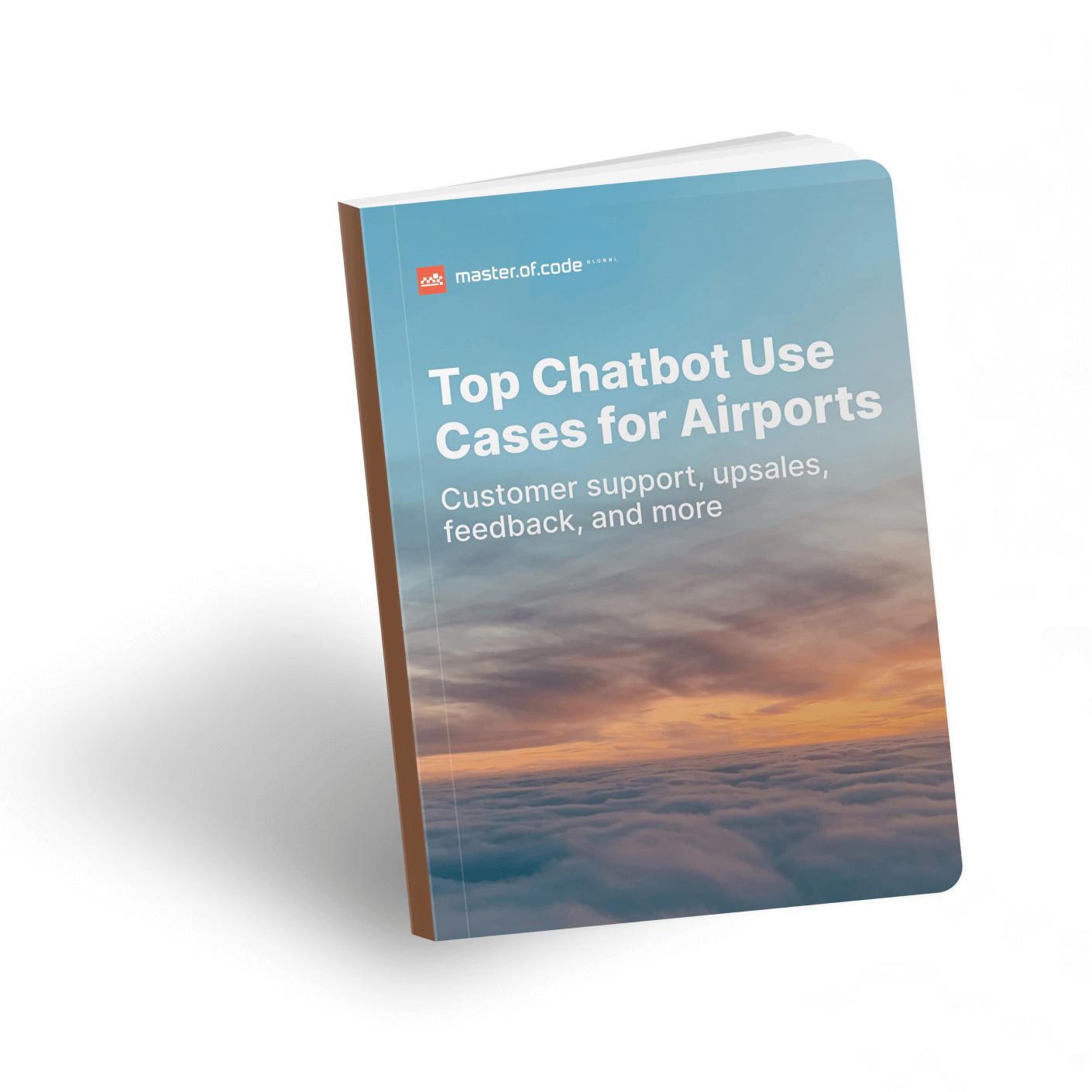Air travel is taking a whole new turn thanks to airline chatbots. These digital assistants are shaking up how we connect with airlines and even changing how companies work behind the scenes. According to SITA’s projection, by the year 2023, around 68% of airlines and approximately 42% of airports will be considering the implementation of chatbot services powered by AI.
In this article, we’re diving deep into the chatbot benefits for both travelers and the airline industry. We’ll explore many use cases and share real-life chatbot examples. So, get ready to discover how these chatbots are giving a fresh twist to your air travel experience!
Table of Contents
Airlines Chatbot Benefits
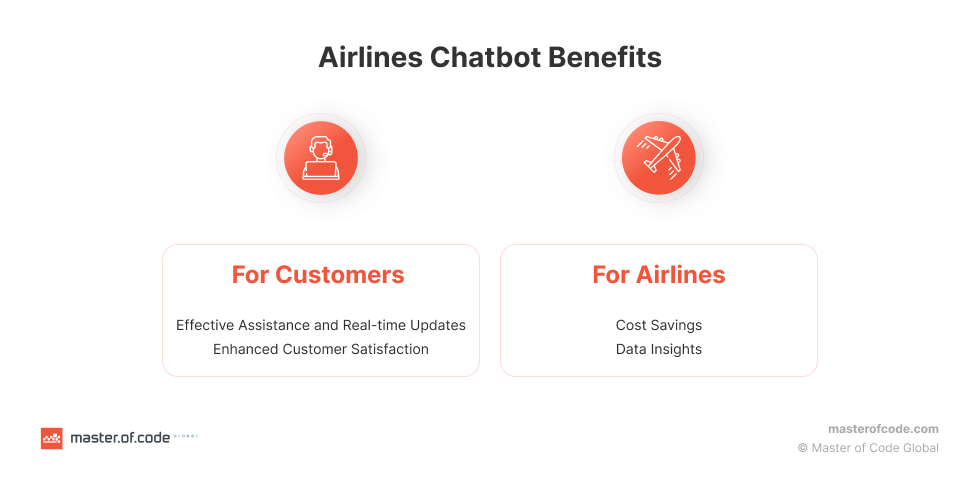
For travelers, chatbots in the airline industry offer more than help. They provide immediate support, granting access to flight-related information and updates. As bots gather insights into customer behaviors and preferences, companies obtain valuable data for services. They also create tailored marketing strategies and respond to new trends. Join us on a journey through the advantages that airline chatbots bring to both customers and airlines.
For Customers
Effective Assistance and Real-time Updates
Customers can receive immediate and efficient assistance, accessing information about flights, services, and policies through the airline chatbot. The airline offers real-time updates on flight statuses, gate changes, and delays to passengers. According to the Salesforce, 58% of clients say that chatbots and voice assistance have changed their expectations of companies.
Enhanced Customer Satisfaction
Research indicates that chatbots achieve a remarkable customer satisfaction level of 73%. Chatbots in airline industry simplify the flight booking process by helping customers in selecting flights, seats, and extra services. Operating 24/7, they provide customers with information and support at all times, regardless of time zones or holidays.
For Airlines
Cost Savings
By automating tasks like FAQs, assisting with bookings, and managing routine requests, companies cut operational costs. This reduces manual work and the need for a large customer support team, resulting in lower expenses. With airline chatbots handling these tasks, companies divide resources, optimize their budget, and raise financial efficiency. Among the top 5 industries benefiting from the adoption of chatbots, travel accounts for 16%.
Data Insights
Airline chatbots collect valuable data on customers’ preferences, behaviors, and concerns when they interact with them. This information helps companies make informed decisions. These decisions improve their services and create targeted marketing strategies. Additionally, they enhance customer experiences. By using feedback and identifying emerging trends, companies adjust their offerings to match the changing demands of their passengers.
Airline Chatbot Use Cases
In our blog, we have discussed the use of bots across various industries, and now it’s time to delve into the airline sector. We’ve outlined 9 airline chatbot use cases that show how chatbots enhance a more inclusive and engaging travel journey.
Automate Flight Search & Bookings
How does a journey typically begin? We usually start by planning a trip to a certain country. Then we search for flights on Google, selecting the option that best suits our preferences. Airline chatbots automate the flight search and booking processes. Customers can ask the bot to find available flights, compare prices, and complete the booking process.
Flight Updates
Whether you’re arriving at the airport on time or not, all travelers want to stay updated on flight information. An airline chatbot notifies passengers about departure and arrival times, gate changes, delays, and other important flight-related details.
Baggage Tracking and Claims
Passengers address lost baggage as one of the most common issues with customer support. Airport chatbots can enhance baggage tracking systems, providing a convenient method for passengers to track their baggage. Passengers also start claims in case of lost or delayed luggage. Plus, customers inquire about their bag’s status and receive support with the claims process.
As reported by The Guardian, out of the 26 million mishandled bags in 2022:
- 80% experienced delays
- 13% of bags suffered damage
- 7% went missing
Remote Check-ins
Statista’s research, shows the trend of airports including self-service options from 2015 to 2021, along with a forecast for 2024. In the 2021 study, the concept of self-service bag drop gained significant attention, with approximately 52% of airports offering this opportunity. By 2024, experts expect this percentage to increase to 75%.
Chatbots reduce the need for staff, printing expenses, and waiting queues. Checking in via a virtual assistant is more comfortable compared to using the airline’s website. This approach is both more convenient and time-efficient.
Claims and Refunds
Passengers often navigate through various options when filing claims. They also request refunds for various travel-related matters. These matters are usually complicated. Chatbot for the airline industry assist with filling out claim forms. This is useful for situations like flight cancellations, schedule changes, or service disruptions.
Navigating Airports
Many air travelers plan their journeys with connecting flights. However, changing planes at a transfer airport can be challenging. This challenge is especially true when navigating through some of the world’s busiest airports. One such example is Hartsfield-Jackson Atlanta International. It can be difficult while trying to find your gate.
Airport chatbots enhance the flying experience by navigating these spaces. These bots offer travelers details about airport layouts, terminal directions, and available amenities. Passengers receive guidance on reaching their gates, lounges, and other facilities.
Special Assistance Requests
Nowadays, airlines have taken steps to enhance inclusivity by offering specialized assistance and services. Certain passengers need individualized attention during the flight journey: boarding, disembarking, and ground handling. The passengers needing such attention include individuals using wheelchairs, those with visual or hearing impairments. Also, individuals who are pregnant and those with specific medical requirements.
With the help of the bot, airline customers can request help, such as wheelchair services and medical support, as well as booking specific seats. This simplifies the processes that persons need to follow to use such services.
Flight Payments or Reimbursements
Imagine you’ve booked a flight and need to make a payment for extra services like baggage fees. Instead of navigating through many pages on the website, you engage with chatbot for airlines. The bot guides you through the payment process, making it swift. Let’s say your flight gets canceled due to unforeseen circumstances. Instead of grappling with phone calls and forms, you can use the same chatbot to request a reimbursement.
Targeted Personalized Offers
Whenever you’re planning a vacation, consider using an airline chatbot. Based on your past travel history and preferences, it presents you with a tailored offer for your dream destination. It includes discounted flights, exclusive hotel rates, and even suggestions for activities you might enjoy. This personalized approach ensures that you receive offers that resonate with your interests.
Seat Selection and Upgrades
Choosing or changing your seat doesn’t need to be a manual task. Bots guide passengers through open slots maps, help them select preferred options (like extra legroom or window seats), and suggest upgrades when available. This creates a more flexible and individualized travel experience, without waiting in line or logging into multiple platforms.
Travel Documentation and Entry Requirements
Understanding visa rules or entry requirements for different countries can be confusing. Smart systems assist clients by providing real-time guidance on necessary documents according to their nationality, destination, and transit points. Whether it’s vaccination proof, visa details, or health declarations, the bot simplifies pre-trip preparation.
Post-Flight Feedback Collection
After landing, the customer journey doesn’t end. An AI algorithm prompts people for feedback, helping companies collect insights on delays, service quality, or in-flight experience. This automated follow-up not only shows that the airline values its customers’ voices but also supports continuous service improvement.
Real Airline Chatbot Examples
AI-Powered Parts Bot for Aviation, Master Of Code Global
An example of how AI is transforming aviation operations is the AI-Powered Parts Bot developed by Master of Code Global. This conversational assistant streamlines the process of sourcing critical aircraft components, automating tasks like checking part availability, tracking orders, and managing customer queries. The bot’s deployment helps airlines reduce call volumes and speed up response times, much like the chatbot solutions that assist travelers with booking and service-related inquiries.
By expanding its functionality across web, voice, and SMS channels, this solution offers airlines the flexibility to engage with their teams and customers in the most efficient way. Just as Wizz Air’s Amelia provides 24/7 support for flight statuses and bookings, this AI-powered bot ensures airlines can maintain a high level of service without manual intervention, improving both operational workflows and customer satisfaction.
Wizz Virtual Assistant, Amelia
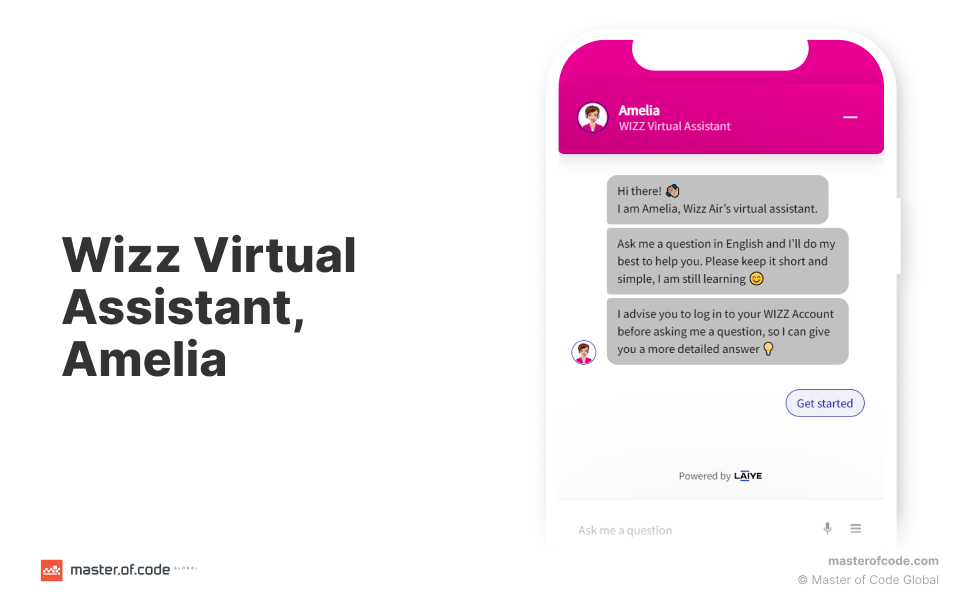
Named after the American aviation pioneer Amelia Earhart, Wizz Air’s new chatbot offers 24/7 information about bookings, flight statuses, and other services. Travelers can receive advice and guidelines to address their specific inquiries. Wizz Air have created the Amelia airline chatbot to offer answers to common questions related to COVID-19, special assistance, baggage, payment methods, check-in procedures, voluntary cancellations, traveling with infants, and WIZZ services.
I am delighted to introduce Amelia, our virtual assistant who is a real game-changer in Wizz Air’s customer experience solutions. Automating and digitalising our processes is key in delivering ever higher customer satisfaction.
Singapore Airlines Chatbot, Kris
Kris is a 24/7 aide rolled out by the corporation to support travelers with a wide range of topics—from baggage allowances and lounge eligibility to waitlist updates and infant travel guidelines. The bot offers instant answers before, during, and after the journey. And when a request goes beyond its scope, it smoothly escalates the conversation to a live agent, ensuring no question remains unanswered.
Ethiopian Airlines Chatbot, Lucy
Lucy is an upgraded virtual assistant introduced by the carrier to empower both domestic and international travelers. Available on Telegram and Messenger, the tool helps users reserve flights, make payments, check in, track flight status, and get baggage info—now in both Amharic and English. With features like multi-currency transactions and feedback collection, the assistant aims to simplify travel processes across touchpoints.
KLM Chatbot, BlueBot (BB)
BB is a Conversational AI solution launched by the airline to enable smooth bookings via Messenger. With a friendly, self-learning personality, BB guides clients through ticket purchases and hands off to a live agent when needed. Backed by 250 human workers, the bot blends automation with a human touch and is evolving to facilitate more services and digital channels.
Air France Chatbot, My Trip Assistant
My Trip Assistant is an AI-powered chatbot developed to help customers with baggage-related questions. Integrated directly into the booking system, it delivers personalized responses based on each traveler’s reservation. As part of a broader AI strategy, this application supports the company’s mission to enhance service while protecting user data through secure, closed-circuit deployments.
Turkish Airlines, Travel Assistant Boti
Most frequent flyers are familiar with Turkish Airlines. The travel chatbot Boti, available on messenger platforms like WhatsApp, makes finding the right flights and special offers much easier. Boti offers a range of features including availability searches, promotions, check-in assistance with mobile boarding passes, flight status updates, airport maps, and FAQ responses. This airline chatbot can address inquiries about tariffs and cargo status on the dedicated Turkish Cargo WhatsApp number.
Master of Code is proud to have designed and built the Luxury Escapes Travel Messenger Chatbot. It changes how users search for deals based on their preferences and book trips around the world. In three months since its launch, the travel chatbot generated over $300,000 in sales revenue.
From Success to Setbacks: What Airline AI Chatbots Get Right—and What Can Go Wrong
As the previous examples have shown, such solutions greatly improve the passenger journey, automating bookings, tracking baggage, and providing real-time updates. But not every implementation has a happy ending.
While the benefits are real, so are the risks. When chatbot experiences go wrong, they don’t just frustrate users—they can damage brand trust or even result in legal liability. Let’s take a look at a real-world cautionary tale before diving into the key reasons bots fail and the expert practices that prevent it.
When Airline AI Chatbots Fail: The Air Canada Case
In a landmark 2024 ruling, Air Canada was held legally responsible for incorrect information provided by its virtual assistant. A passenger had asked their bot about bereavement fare rules and was told he could apply for a discount after booking. After the flight, his request was denied because the policy actually required applying beforehand. The airline argued the chatbot was acting independently, but the court firmly disagreed.
The British Columbia Civil Resolution Tribunal ordered Air Canada to pay damages, setting a precedent that companies are liable for what their bots say. The case highlights a critical point: no matter how advanced the technology, businesses must own the outcomes. Poorly designed or unsupervised solutions aren’t just a technical issue—they’re a business risk.
To help avoid these kinds of failures, we’ve outlined the most common pitfalls and shared practical recommendations from our AI specialists below.
Why Chatbots Fail
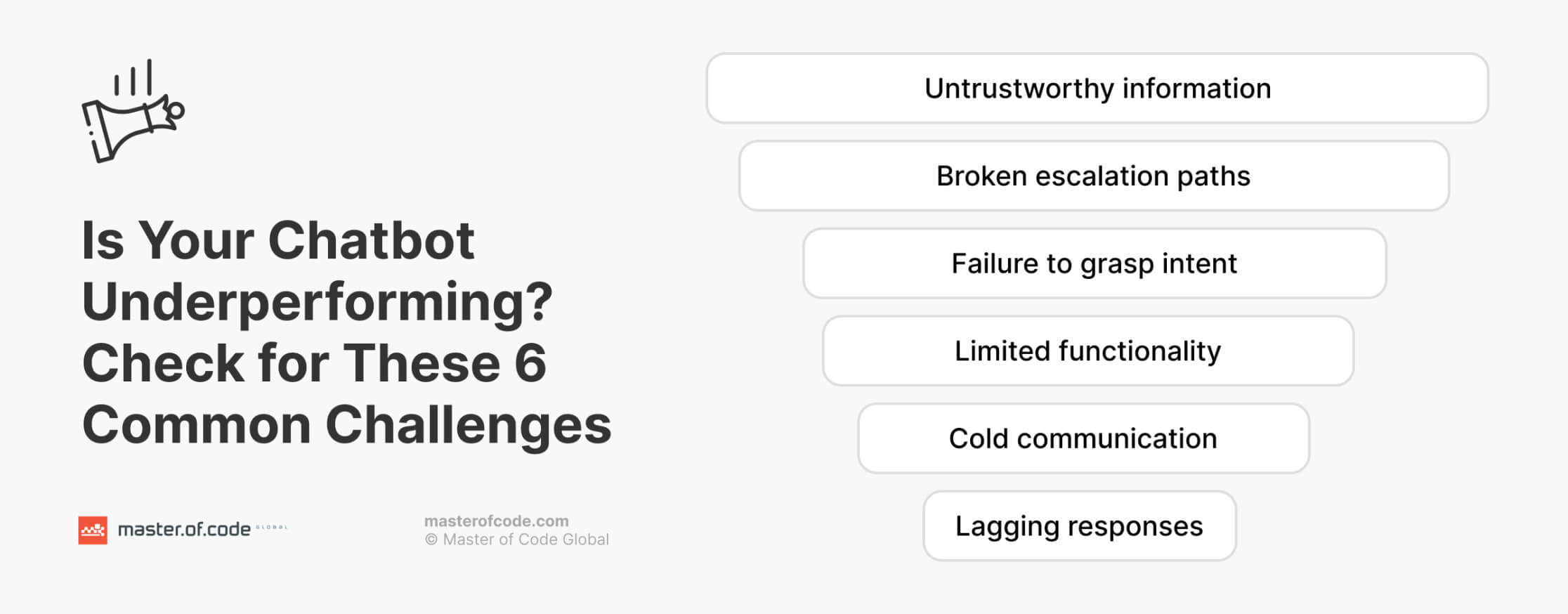
Even a well-intentioned assistant can sabotage user experience if not designed or maintained properly. Here are six typical causes behind those breakdowns:
- Lack of Understanding. Poor NLP capabilities lead to misinterpretation of user intent, forcing customers to rephrase or abandon the conversation.
- Limited Functionality. Bots that only handle basic tasks quickly frustrate users expecting versatile, intelligent assistance.
- Impersonal Tone. Cold, robotic language makes customers feel like tickets, not people—hurting brand perception and engagement.
- No Seamless Escalation. Failure to transfer unresolved issues to human agents leaves users trapped in a frustrating loop.
- Inaccurate Responses. Hallucinations or wrong answers break trust and, like in Air Canada’s case, have legal consequences.
- Slow Performance. Laggy answers disappoint users who expect immediate, frictionless service, especially during stressful travel situations.
How to Get It Right: Best Practices from Master of Code Global Experts
We’ve worked with top-tier brands across travel, finance, healthcare, and retail. Here are our expert-backed strategies to build reliable, scalable, and human-friendly chatbots:
1. Design for Seamless Handoffs
“Don’t trap users. If a bot fails to understand after two tries, hand it over.”
Natasha Gouws-Stewart, Head of CX & Conversation Design
2. Set Clear Expectations
“Always inform users they’re interacting with a bot. Transparency builds trust.”
Bogdan Sergiienko, CTO
3. Combine LLMs with Deterministic Flows
“Use LLMs for flexibility and deterministic paths for structure. Together, they balance power and control.”
Petra Gal, Lead Conversation Designer
4. Fail Gracefully
“When the bot doesn’t know, say so. Use fallback messages that feel human and helpful.”
Olena Khudyna, AI Trainer
5. Personalize Conversations
“Give your chatbot personality. Users respond better to friendly, on-brand experiences.”
Ivana Velickovic, Conversation Designer
6. Use High-Quality Training Data
“Well-labeled training sets are the backbone of an effective NLP model.”
Iurii Dziuban, Backend Engineer
7. Design for All User Types
“Offer both button-based and free-text options to meet different user preferences.”
Ivana Velickovic, Conversation Designer
8. Collect Feedback & Iterate
“Track CSAT, NPS, and open text feedback to improve over time. It’s where the real insights live.”
Yevhenii Opanasenko, QA Engineer

Airline chatbots hold immense potential—but only when designed with care, clarity, and continuous improvement in mind. As the Air Canada case illustrates, brands must treat these systems as serious customer touchpoints, not side experiments. A thoughtful strategy backed by expert insight can ensure your chatbot becomes a brand asset, not a liability.
What’s Next: Smarter, Simpler Airline Bots with Generative AI
Following a clear design, strong escalation paths, and reliable training data is essential—but what if your assistant could go a step further? That’s where Generative AI comes in.
Unlike traditional bots that follow fixed rules, generative models understand more complex questions, carry context over longer chats, and respond in a more natural way. This doesn’t mean replacing human agents—it means reducing their workload and improving the overall passenger experience.
Here’s what GenAI takes it to the next level:
- Answer layered or open-ended questions
- Personalize replies using booking and travel history
- Handle follow-up requests without losing context
- Support more languages with a clearer, friendlier tone
- Summarize policies or instructions more clearly
- Escalate to human agents with a full chat summary
Some airlines are already seeing the difference.
IndiGo
India’s largest airline has introduced “6Eskai,” a GenAI-powered chatbot that now handles 75% of inquiries without human involvement. This significantly reduces pressure on contact center agents while ensuring travelers get quick responses around the clock.
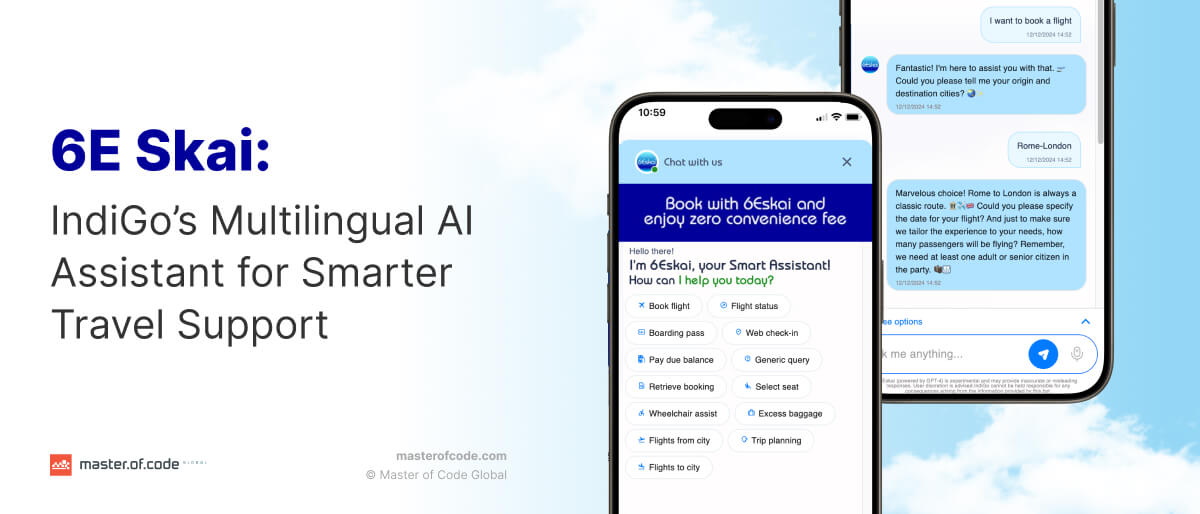
Air India
Their bot, “AI.g,” boasts a 93% containment rate, meaning only 7% of interactions need to be escalated to human managers. It manages everything from flight details to basic customer service, helping streamline support at scale.
Qatar Airways
The company unveiled Sama 2.0, the world’s first AI-fueled digital human cabin crew, at ITB Berlin. Accessible via QVerse and the mobile app, Sama helps passengers with FAQs, destination info, and travel aid, while continually learning through interaction to deliver more personalized service over time.
Singapore Airlines
This brand is working directly with OpenAI to enhance its client and staff-facing AI tools. The upgraded virtual assistant will use multimodal capabilities—understanding text, diagrams, and even voice—to provide seamless trip planning and help agents make faster decisions with less effort.
Alaska Airlines
The corporation launched Alaska Inspires, a natural language search instrument that allows travelers to discover destinations using everyday phrases like “Where can I go skiing for under 4 hours?” The tool delivers customized suggestions and is part of a broader GenAI strategy to make booking more intuitive and guest-focused.
Sum Up
As we’ve explored the diverse benefits, use cases, and examples, it’s clear that the sky’s the limit for the potential of airline chatbots. With their ability to simplify processes, personalize experiences, and bridge the gap between passengers and airlines, we can say that the journey ahead for air travel is more streamlined, and engaging, all thanks to the power of AI-driven chatbot technology.
With their ability to simplify processes, AI-driven chatbot technology personalize experiences and bridge the gap between passengers and airlines. This makes the journey ahead for air travel more streamlined and engaging. All thanks to the power of AI-driven chatbot technology!
Master of Code collaborates with world’s global companies to create and develop Conversational AI services.
If you’re thinking about making your own airline chatbot, discover how Master of Code can help enhance your customers’ travel experience and boost sales growth.




